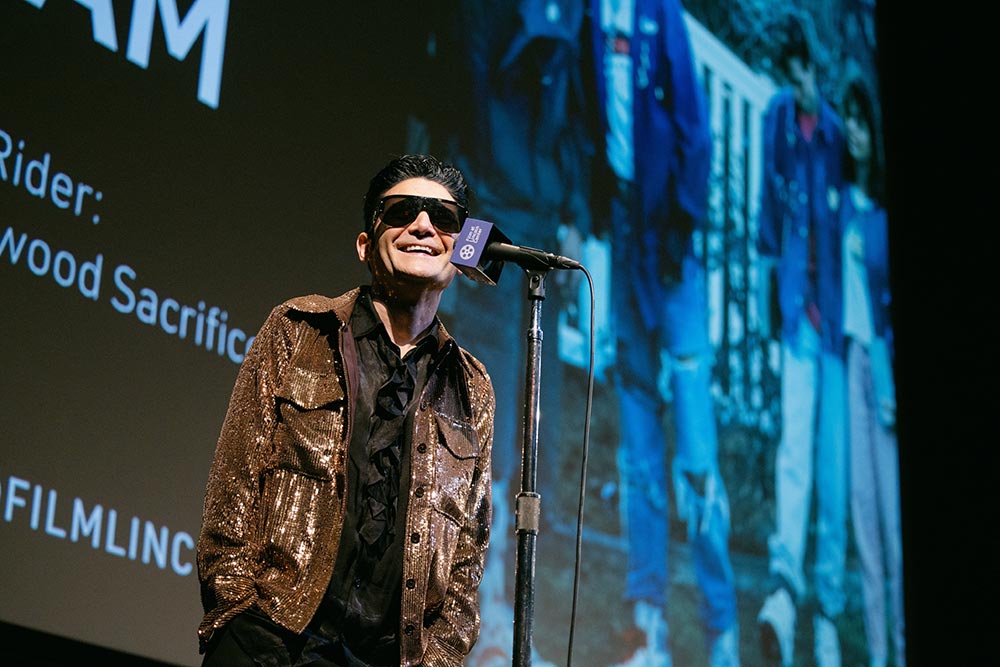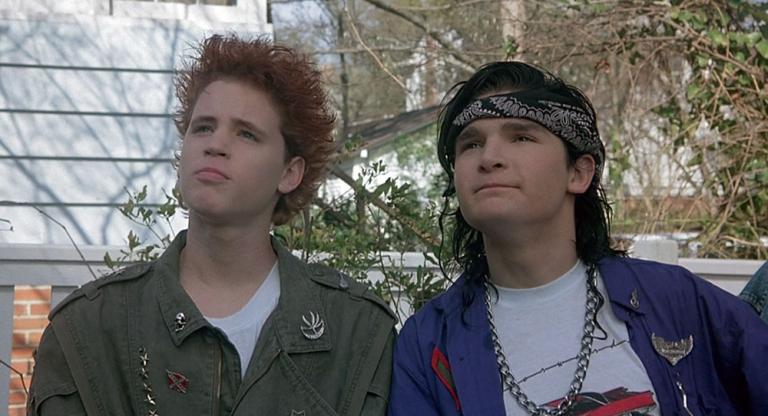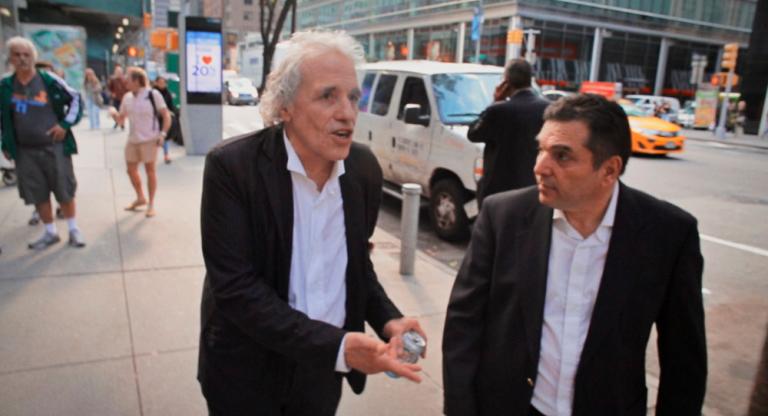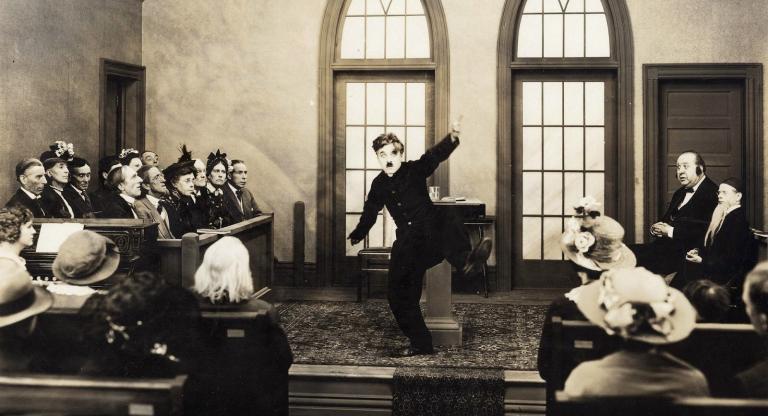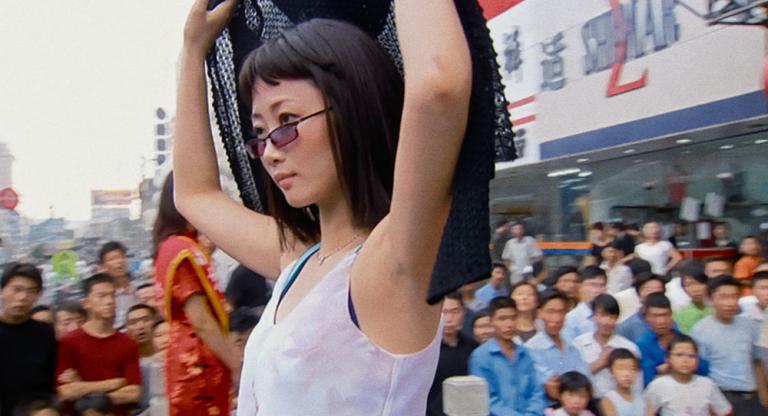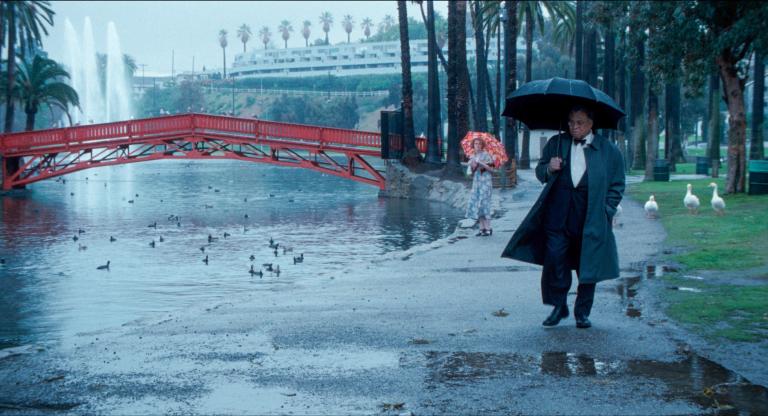In February 2022 (2-22-22, to be exact), Corey Feldman released the first single from his album Love Left 2: Arm Me With Love. It was called “Comeback King,” and he directed the video himself. It starts out with a young boy getting beat up at some type of backyard volleyball game. The scrawny kid is knocked over, leaves and dirt kicked in his face. It cuts to a fogged-out soundstage, where we see Corey, in a deep v-neck tee and an unbuttoned ruched satin shirt, sunglasses at the tip of his nose, a lock of hair in his face. He does his best Michael Jackson inspired routine and sing-raps, “You know what time it is? It’s a comeback! I’m the comeback king!” Upon its release, he wasn’t exactly in the middle of a comeback. Rather, he was manifesting one.
Last month it was announced that director Jordan Peele would be curating a series at Film at Lincoln Center featuring a selection of films that inspired, or could help contextualize, his most recent blockbuster, Nope (2022). He called it “The Lost Rider: A Chronicle of Hollywood Sacrifice.” No one expected the inclusion of four films featuring Corey Feldman: Stand By Me (1986), Dream a Little Dream (1989), Friday the 13: The Final Chapter (1984), and the U.S. premiere of an obscure movie from 2004, The Birthday. Feldman’s career needs no introduction. He was in countless ’80s hits like The Goonies (1985) and Gremlins (1984). He went on to star in a multitude of features with his best friend, Corey Haim, and they became known as “The Two Coreys.” Haim passed away in 2010, and Feldman made a documentary about his story and the darker side of Hollywood called My Truth: The Rape of 2 Coreys (2020). In a life of extreme highs and lows, Feldman has never stopped grinding out movies, TV shows, music videos, and countless viral moments. He even wrote an autobiography, Coreyography, and just dropped a box set of new and remastered tracks. I Zoomed with him midway through the Lincoln Center series, on the eve of the belated U.S. premiere of The Birthday.
Lead image courtesy Film at Lincoln Center/Arin Sang-Urai
MB: First of all, I wanted to say congratulations on the series. I assume you're feeling pretty good right now?
CF: I'm feeling very good. I'm very grateful. You know, if it wasn't for the keen eye of the great Jordan Peele, none of this would be happening.
MB: It’s a tag team no one saw coming. How long have you guys been friends?
CF: It’s a funny history. We’re new friends. It's been a bit of a courtship, I guess you would say. But a very peculiar courtship. When his film Us came out, he was doing a lot of publicity, and I got a Google News pop-up that he had mentioned me. I thought, “What do I have to do with this film? I have nothing to do with this.” In the interview, he said there are two or three Corey Feldman easter eggs in it. So I went and watched the film, and I was like, “Oh, yeah, okay, I get it.” That was pretty cool. And that was that. Then the trailer for Nope comes out, and I see another interview with him that goes viral where he mentions me and says, “I'm a big fan of Corey Feldman.” And everybody sent it to me like, “Oh, Jordan Peele is talking about you again.” I was like, “Why is this guy talking about me all the time?” It's cool, but, you know, I was a little confused. Then I got an invite to the Nope premiere.
MB: The golden ticket!
CF: So I went, and loved the movie. At the afterparty I walked up to him, and he was wearing a mask, because it was still Covid times. And I had a mask on, too. I kind of tapped him on the shoulder and said, “Jordan, it's Corey. I just wanted to say thank you for the invite. Great movie. Well done.” And he sees me, and his face lights up, and he gives me a big, giant hug. And he goes, “Corey, Corey, can I get a picture?” And I said, “Of course, it's your night, man, whatever you want.” So we dropped the masks to take a picture. Then he kind of whispers to me, “Hey, see my phone in my pocket? Grab my phone out of my pocket and put your number in it.” And I'm like, “Okay,” so I put my number in it. And that was that. Before we left, Keke [Palmer] came up to me, and she was very excited as well. Very passionately, “Oh, my god, I can't believe you're here. This is amazing. I'm a huge fan, me and my sisters. We all love you. You're such a big deal to us. In fact, we are total fans of The Goonies, and we all went to Vegas last month and got matching Goonie tattoos.”
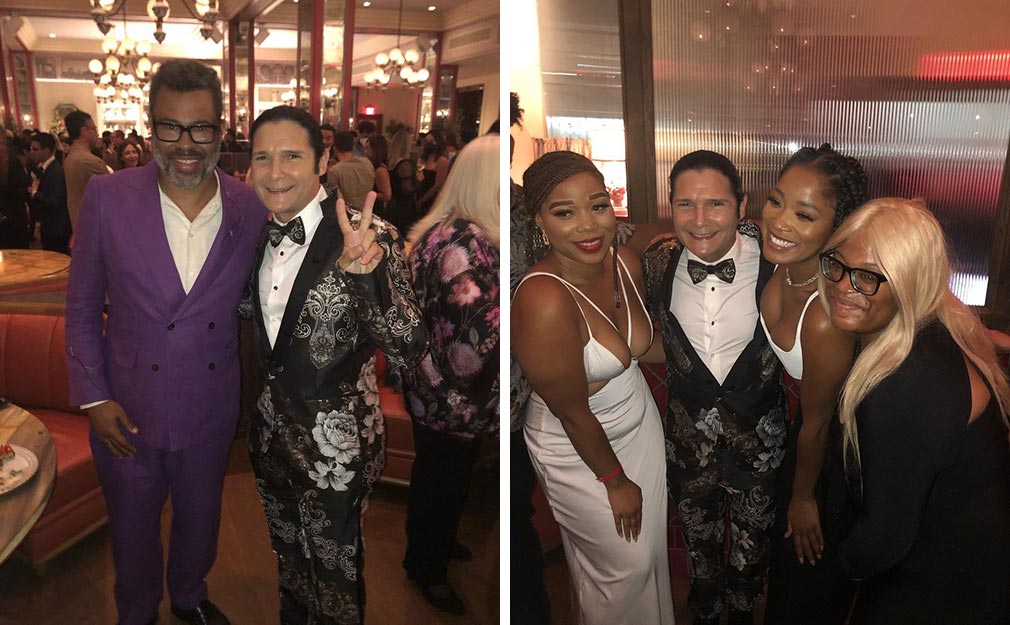
MB: Oh my God. Come on.
CF: The whole thing was overwhelming. It's their night, it's their movie, and they’re all super excited about me being there. I was like, “This is so surreal.” But it was fun. It was nice. And then I get a text, and I write back, “Nice meeting you” and stuff, and that starts a conversation. Right away we hit it off. We're just talking about film-type stuff and comparing notes, and that's when he said to me, “Listen, I gotta be honest with you. I feel like I owe you a huge debt.” And I said, “What do you mean? You don't owe me anything.” He said, “No, but I kind of do.” I said, “How is that?” — “Well, because I've been stealing from you, or borrowing from you, for many years. You've basically been my muse for all of the films I’ve made. Hopefully you got the references in Nope.” I said, “Yeah, yeah definitely; the kid actor and the subplot, the darkness of the industry.” He’s like, “Right, yeah! You totally hit it on the head. A lot of people don't get that, but you got it. Great. One day we'll work together. I feel like I owe you. So we'll have to come up with something fun.” And it was like, “Yeah!”
MB: Incredible.
CF: Then my wife says to me, “Since he wants to work with you, you should show him The Birthday because that's your best work.” It was never released in theaters here.
MB: I’d never heard of it. It really feels like a “lost” film.
CF: Yeah! So I invited him over, and that was really what sparked all of this—his instant love for the movie. He was like, “Look, this is a cinematic masterpiece. Your performance is groundbreaking and mind blowing. And the world needs to see this.” Those were his words.
Then out of nowhere, a month later, I got a text from his producer. He says, “Jordan is putting together this film series and wants to include your films.” There were originally going to be four Michael Jackson films in there too. Then they got rid of all those except for The Wiz. So originally, it looked kind of like a "Michael and Corey” festival. That would have maybe been a little too controversial.
MB: [laughs] And here we are, now.
CF: I'm very indebted to Jordan for this revival. Stand By Me and Goonies, Lost Boys [1987], those movies screen all over the place, all the time. But a real special one, Dream a Little Dream, doesn’t.
MB: How did it play the other night?
CF: I hadn't seen it on the big screen since Neverland. That was the last time I watched it on the big screen.
MB: Whoa! What was that like?
CF: It was fun. I mean, unfortunately, it was a weird time, because it was when Michael was dealing with a lot of legal stuff surrounding the whole case and all the stuff that happened. He had to kind of run in and out to deal with lawyers. But he did get to see the dancing, which was, of course, the most important part. And he was super blown away by that. Because he knew I danced, we danced together and stuff like that, but he'd never seen it on film. So when he saw it, he was like— he was just giggling and [in a high pitched voice], “Oh, wow, awesome.”
MB: From Neverland to Lincoln Center, it’s back and on 35mm film! In your intro for Dream a Little Dream the other night you were expressing some interesting theories about celluloid.
CF: Yeah, I learned all that from becoming friends with the president of Kodak. We sat down at lunch. and he explained to me that film actually is a living organism, which I did not know. It's very fascinating. And it's true. When you're watching a film, it's part of life. You're watching an existing life that is not just the recorded life, but it's the actual living, breathing film that you're viewing. That is giving you an extra layer of experience, because it gives it a depth that you can't get on video, you know. It's so much richer: the texture, the depth, all of it.
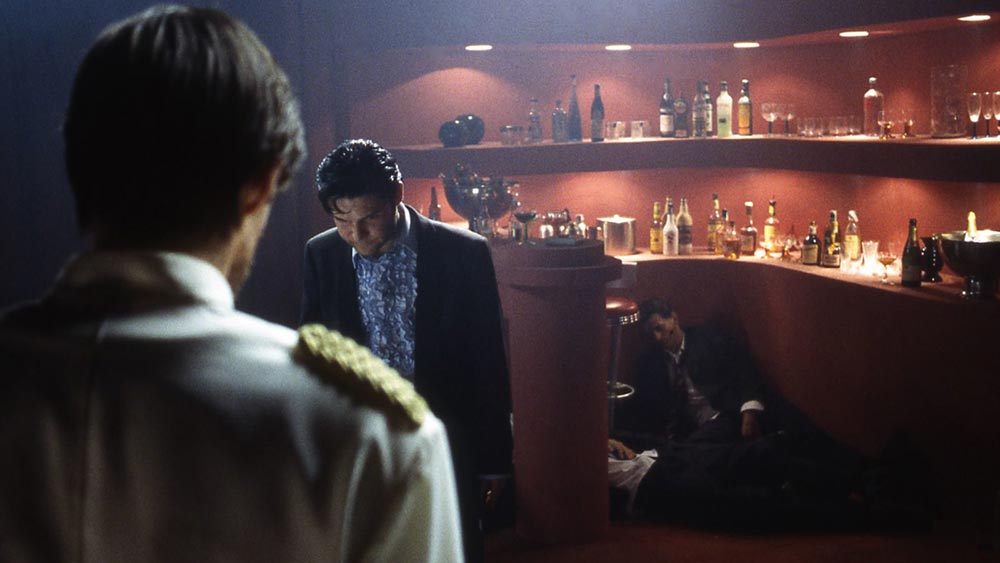
MB: Tonight, American audiences will finally see you as Norman Forrester in The Birthday. And it’s a singular performance. It feels different than a lot of the other work you’ve done. You have an almost Jerry Lewis–like energy in it.
CF: It's funny, People say Jerry Lewis, but it's really not at all. That's the irony of it. In no way, shape, or form was I referencing Jerry Lewis at any time during that production. I was very encompassed by becoming Norman Forester. I lived and breathed the character, I was literally in that character, in that voice, with the physical mannerisms. 24/7. I would go home at night, and my wife would be like, “Hello? where’s my husband? Is my husband in there? I don't want to go to bed with Norman.”
MB: I’m happy that you were able to return to being Corey.
CF: Listen, I've done so many films. Unfortunately, the best of my work is always somehow just not seen. If I didn't know better, I might think that there was a force of some type that was literally making an effort to thwart my success and prevent my major breakthrough roles from ever getting noticed. You never know. The powers that be have certainly tried to put a kibosh on my career for many years.
MB: I watched the livestream of My Truth, so I know.
CF: Then you know, all about…
MB: The Wolfpack! They tried to shut it down.
CF: Right. The point being there's a couple other [suppressed or under-seen] films [like The Birthday]. There's one which changed titles probably five times. I think the last title it was released under was We Will Rock You. It was called Bye Bye Bin Laden at one point. All these different names, but a great film. It was another one where I did a huge departure. I'm wearing prosthetic makeup the whole time. You don't even know it's me in there. There's three or four films in that vein, where I really feel like you don't see any trace of Corey Feldman on screen. You just see the character, and I love that. That, to me, is what acting is all about: being able to dive into a character and become that character and not see the same guy. You don't have to be a great actor to play yourself over and over and over. That was never something I wanted to do. I never want to be pigeonholed and never wanted to be locked into being Corey as a character. I want to find a character that’s a challenge, that's something that I have to really strive to become. I think that's the fun of it.
MB: Talking about Corey the “character,” maybe we could get into television. I interviewed Oliver Stone recently. He appeared in a reality show called Dream School and was really unhappy with both the experience and the final product and never did it again. But I feel like, with your career, you've done such a great job working in reality TV.
CF: No, I agree with Mr. Stone. I don't like the medium of reality TV. I would never do it again. I've said that before, but then I did that Marriage Boot Camp show. But I had to do it as a means to an end, to get the finances to finish the My Truth documentary. I did stick to my word after The Two Coreys, which I produced. I did the first reality show, which was The Surreal Life, and that was just a shit show. Right? And nobody was thrilled about it, particularly me. I was very, very pissed off. Very offended. And I swore to never do reality again unless I could produce it myself. Because I saw how cunning these producers were and how they like to shape shift—tell you one thing and then completely pull the carpet out from underneath you and change everything, and misguide the audience as to what's really going on and who you are. It's kind of the opposite of reality. It's non-reality.
MB: I enjoyed your rapport with Aaron Carter on Marriage Boot Camp. It was tragic to hear of his passing in November.
CF: Terrible.
MB: His story, as a child celebrity, and the struggles that come with it, taps into a lot of themes you’ve addressed in your book and documentary. What was your experience with him?
CF: It's a very tough one. He had a lot of very deep-seated psychological stuff going on. When I showed up there, Aaron immediately kind of threw himself on me. He's like, “Corey, What's up, buddy? What's up, bro?” And I had no idea who he was, because they don't tell you who else is gonna be there. And I was like, “Who is this kid? Who are you?” He's like, “I’m Aaron Carter.” And I'm like, “Oh, yeah. I know the name.” He kind of had that Corey Haim energy. To be honest, there were a lot of similarities.
MB: It felt that way watching it. There was a deeply uncomfortable part where he conjured Corey Haim and started talking to you as him.
CF: That was a weird-ass moment. It was very strange. Aaron needed all this attention and all this love. It was almost like, “Look, dude, I'm supposed to be here to deal with my own family, not to take care of yours. But that said, I have a heart. I understand what you've been through. We've been through so many of the same things. So I want to be there for you.” And I did feel that Corey Haim energy. After the show ended, he started talking trash about me in the trades. Later he told me, “I'm doing it on purpose. I'm gonna make us a lot of money. I want to do celebrity boxing. You and I can have a big boxing match and we can fight it out. We'll get paid a ton of money.” I’m like, “No, man. No. I'm not interested in that. I'm about peace and love.”
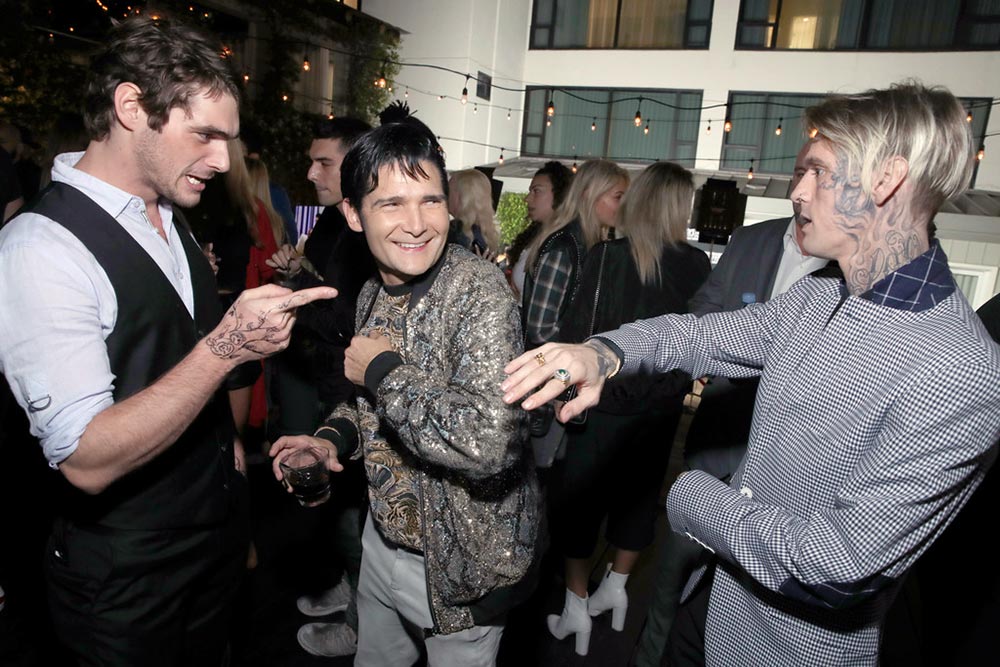
MB: You didn’t feel like throwing down at all? Not even a little bit?
CF: It's not my scene. I was like, “Look, dude, I respect what you're trying to do, but don't drag me into it.” And then he went back to talk more crap. It was very sad, because I really did love him and care about him.
MB: Let’s shift gears. I’d like to discuss your look for a second.
CF: [laughs] And how much crap I get for it? Right?
MB: It’s entirely unique. Very few celebrities have cultivated as distinct a personal style as you.
CF: Thank you. I like the avant-garde. I'm an artist. So I think, as an artist, you live and breathe art. When I go out to do something, I'm putting on my costume. It’s the same as if I was dressing up to be a character. But the character is, you know, Corey, as opposed to Norman or Teddy or Edgar, or whatever. If I'm going to an autograph signing, a concert, or whatever, I'm going to perform. I'm going to be the celebrity that they know and love. And I think that should always evolve.
MB: Excellent philosophy.
CF: I don't think you should be stuck in a box. And I don't think you should conform to anything. You have to be unique. You have to be original. You can't let people browbeat you into submission and formality, because then you're just boring. You're not taking any risks. You're not taking any chances. Now more than ever, this world is about being an individual. It's about being your own person. It's about creating your own destiny and choosing your reality.
We can manifest whatever reality we want. People think it's just luck or being in the right place at the right time. Look, there's a bit of that, it’s true. But, more than anything, it's about manifestation. Every amazing thing that's happened in my life, I've manifested. And, you know, even what's happening right now with this resurgence, or whatever you want to call it. You have to visualize it, you have to dream something up, and then make that dream a reality. It happened for me, meeting all of my heroes, from The Beatles to Pink Floyd to Michael Jackson. You name it. I've met every single hero that I grew up watching, strictly because I sat there and manifested it and believed this is my destiny.
MB: I feel that way about this interview right now. It was manifested! [laughs] And it was destiny. This was really exciting for me.
CF: Thank you.
The Birthday screens tonight, January 13, on 35mm at Film at Lincoln Center as part of the series “The Lost Rider: A Chronicle of Hollywood Sacrifice.” Director Eugenio Mira and star Corey Feldman will be in attendance for a Q&A and an introduction.
